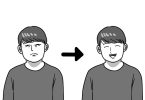So, one question you’ve undoubtedly asked yourself if you’ve had a narcissist in your life is why are they like this? And really, at the root of it, there’s one word that answers the question, and that is shame. Narcissists act the way they do because they’re so afraid of facing the shame that’s buried deep within. But interestingly enough, shame is also their number one weapon.
So, without further ado, let’s get to the five ways that narcissists use shame, their favorite weapon against you.
1. Public humiliation.
The first and most obvious way is public humiliation. So, if you’ve known a narcissist, you’ve probably had the feeling at some point like they were waiting for this moment, they were waiting to have an audience to reveal something about you or to get you to react in a way that you would be ashamed of. To belittle you and make you feel small in front of people who you kind of want to respect you. And any narcissist will make you feel like this was unintentional, it was just speaking the truth, or they were just having an honest reaction to your stupid question. But make no mistake about it, this is intentional. They are intentionally shaming you because when you can’t deal with your own shame, why not make somebody else deal with theirs?
2. Invalidation of your feelings.
Another very common way that narcissists will weaponize shame is by invalidating your feelings. So, this is when they will tell you that your feelings are either too much or you’re being too sensitive. You’re overreacting, you’re making a mountain out of a molehill. And usually, this is because you’re having feelings about their bad behavior. They did something to make you feel a certain way, and now they’re shaming you for the way that you feel about it. It’s your fault. You can’t handle the devaluations and the constant discards. If you were only stronger, you wouldn’t need empathy from me. You would be able to handle all this stuff on your own.
Interestingly enough, sometimes when a narcissist shames you, it might be because they’re feeling shame in that moment. And sometimes, you may have triggered that shame within them. So, for example, let’s say you’re in a situation where you are asking a narcissist for empathy. I mean, not literally, most people don’t literally ask for empathy, but you’re in a situation where you need a little bit of emotional support, and you’re expecting this person to be there for you. And you might even say something like, “I was expecting you to be supportive. I was expecting maybe a hug, maybe some kind words, not an argument.”
A Book: Why Does He Do That?: Inside the Minds of Angry and Controlling Men.
So, what you’re doing there if you’re talking to a narcissist most likely is triggering shame within them because they don’t have that deep level of empathy. They don’t have access to that level of connection. And I personally believe, and I’ve seen evidence to the fact, that the narcissist does know there’s something off. They know that there’s something missing, and they bury that because, again, they’re feeling shame about it, and they can’t allow themselves to feel shame because that’s too painful, it’s too real. So, when you get into the situation where you’re asking for a narcissist to act in empathetic ways and either they don’t know what to do or it’s just not coming naturally, they might be feeling some level of shame about it, and so they lash out at you because they don’t want to feel that shame.
So, it has to be your problem, it has to be your fault. Also, this may be a little bit of projection because, at some point, the narcissist may have been shamed for having feelings themselves. But with all that said, it doesn’t make it right, it doesn’t make it okay. What that is is gaslighting. You shouldn’t be made to feel like your feelings are wrong or too much. You shouldn’t be made to feel like your reaction to something is inappropriate if you’re talking about your feelings.
3. Guilt-tripping (Making you feel not enough)
So, another way that a narcissist will trigger shame within you and weaponize the shame against you is by guilt-tripping. And we do see this often with narcissistic mothers, but we also see it in all kinds of relationships with narcissists. So, the narcissist will make you feel like you’re never doing enough. And because you’re not doing enough, anything that happens, as a result, is your fault. And if you’re in a place where you want or need this relationship to work, you’re going to feel like you’re on a hamster wheel. Like you’re always trying, and it feels all-consuming. Like no matter what you do, no matter how much you step it up and try harder, it’s never enough.
Recommended: Becoming the Narcissist’s Nightmare: How to Devalue and Discard the Narcissist While Supplying Yourself- By Shahida Arabi.
But yet, the narcissist in your life won’t be shy about telling you that you aren’t doing enough, that you aren’t appreciating them enough. And if you’re feeling bad, if you’re feeling like you can’t keep up, well, you know what? You should look at these other people who have less and are doing more. And really, as far as the narcissist is concerned, you should be ashamed of yourself for not upping your game.
4. Withholding love and affection (Intermittent reinforcement).
So, another very common way for a narcissist to weaponize shame against you is by withholding love and affection. And sometimes, this is done through the silent treatment or by just emotionally shutting down. And sometimes, this is done through discards. But really, the overall message here is that you are unworthy. That I am letting go of you, I am releasing you, I’m putting you out in the cold because you are not worthy of love. And the unfortunate part about it is that if you get trapped in a relationship with a narcissist, you go through these cycles where you’re experiencing this over and over again.
Recommended: Healing from Hidden Abuse: A Journey Through the Stages of Recovery from Psychological Abuse.
In so many words, they’ll tell you that you are unworthy of love, and then they’ll come back around and say, “Oops, no, I was just kidding. Yeah, you’re probably worthy of love.” And then, “No, no, actually, I was right the first time. You’re not.” Discard, and repeat. And this is where the trauma bond is formed. It is that intermittent reinforcement that keeps you going back into this situation that is clearly so very toxic.
And if you want to learn more about the trauma bond and how it works and why, although you can take responsibility and reclaim control, none of this is your fault, read this article right here.
Read More: 10 Things You Should NEVER SAY to a Narcissist to Avoid Trouble.
Sharing Is Caring!






